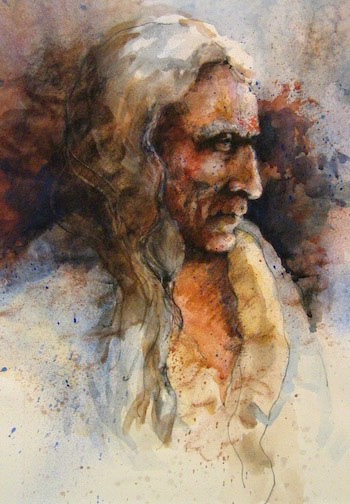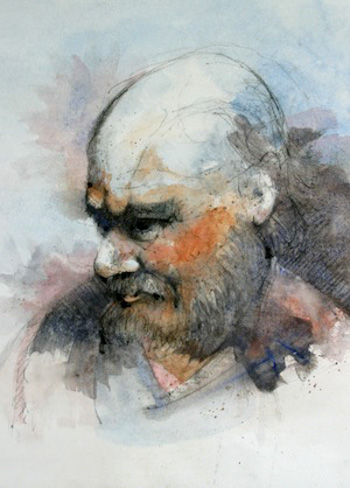The Prophet
 “In a sense, the calling of the prophet may be described as that of an advocate or champion, speaking for those who are too weak to plead their own cause. Indeed, the major activity of the prophets was interference, remonstrating about wrongs inflicted on other people, and meddling in affairs that were seemingly neither their concern nor their responsibility….A prophet is a person who is not tolerant of the wrongs done to others, who resents other people’s injuries.”
“In a sense, the calling of the prophet may be described as that of an advocate or champion, speaking for those who are too weak to plead their own cause. Indeed, the major activity of the prophets was interference, remonstrating about wrongs inflicted on other people, and meddling in affairs that were seemingly neither their concern nor their responsibility….A prophet is a person who is not tolerant of the wrongs done to others, who resents other people’s injuries.”
—Abraham Joshua Heschel
“The fundamental experience of the prophet is a fellowship with the feelings of God, a sympathy with the divine pathos, a communion with the divine consciousness…. The typical prophetic state of mind is one of being taken up into the heart of the divine pathos.”
—Abraham J. Heschel, The Prophets (New York: Harper & Row, 1962), 26
Pass,
When you visited me for the first time, what did you expect to find? A holy man in the mountains? A monastic with beads and a long beard, bearing a prayer book, praying the psalms seven times a day? An aesthetic perhaps, back bare in the hot sun, the tracks of the corded whip as red welts? I hope I have not been too grave a disappointment. The Holy Spirit is quite comfortable with reality—Would you like a cold beer with your lunch?”
Helder confided he had long experienced dreams and open visions. Her voice (and sometimes others) startled him awake, calling his name to come and talk. He is often awakened in the night by his own voice praying loudly—in tongues. For many years, the Spirit’s custom has been to awaken him every night at midnight to come and spend time with Her.
One evening, tired after a long day, he was driving a country road on his way home. Then, he was standing in a field of wildflowers on a sloping hillside with a path leading away and over the hill. Next to him was a man he knew to be Jesus, who said, “Prophet, I need to speak with you. Will you walk with me?” They walked and spoke together for what seemed like a long time, and then he was once more behind the wheel of his vehicle on his way home. No time had passed.
• • •
The writer of Matthew has Jesus prophetically weeping and praying,
“Oh Jerusalem, Jerusalem, killing the prophets and stoning those I sent to you, how often would I have gathered your children together as a hen gathers her chicks under her wings and you would not.”
—Matthew 23:37
Grandfather Helder was kindly, affirming, and poignant, and I Loved being with him. Speaking of Her Love, his prophetic voice might be winsome, invitational, provocative, and when addressing injustice, was tinged—and sometimes more than tinged—with anger. He had no problem confronting the absence of fairness in his day’s political, social, economic, medical, and particularly religious domination systems.
The religious status quo branded him a troublemaker because of his prophetic gift.  But hasn’t that always been the lot of the Prophet? He said, on occasion, things like,
But hasn’t that always been the lot of the Prophet? He said, on occasion, things like,
“Professional clergy has outlived their usefulness,” and “We make disciples to send them away, not to collect them.”
Not how you make friends among those who make their living collecting disciples. Disciples represent tithing units, and more and more tithing units are how clergy earn their keep. Having little interest in Church as usual, he was a reformer and endorsed change as a hallmark of growth in the Spirit. And change was the last thing they wanted. As a result, he is ending his life with few religious friends.
I didn’t experience Helder as lonely. However, he told me of times in his life when he experienced loneliness as a prolonged and tangible presence. At one point, he asked Her to remove it, to which She replied, “I have removed your loneliness, and I have filled the void left behind with loneliness. It is your unfulfilled desire for me. It will be there as long as I am.”
• • •
Denied by Grace, the knowledge that I know not.
The winsomeness of She who said,
“You see, you should begin again.”
Instead, I know now only Her least, my most.
Denied by Grace, the pedagogy of my peers
never uttered they their wisdom,
rendered word by word,
to apprehend such sleuth.
Denied by Grace, the comfort of the common prayer.
Unique beset by tragedy….in grief
for those inside—that ordered knowing way.
I apprehend, instead…a separate peace.
Denied by Grace, assurance, impressed of where I lean….
outside alone, no witnesses to fall back on.
Speaking in, I said, “Come out! You know you should go home.”
I learned to Love….instead, my friend, this homely vagrant way.
—Helder